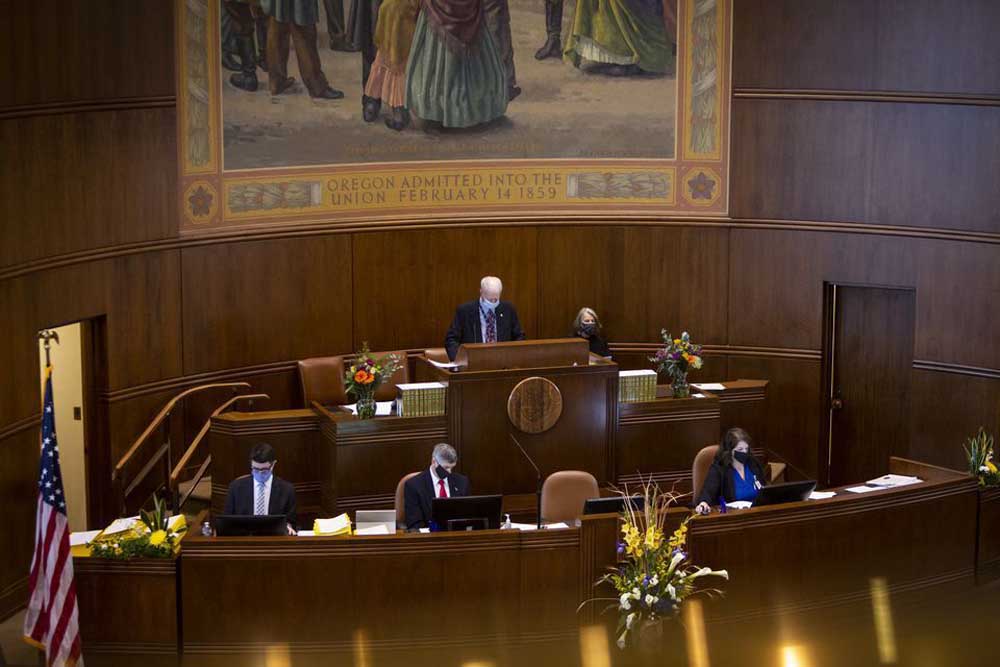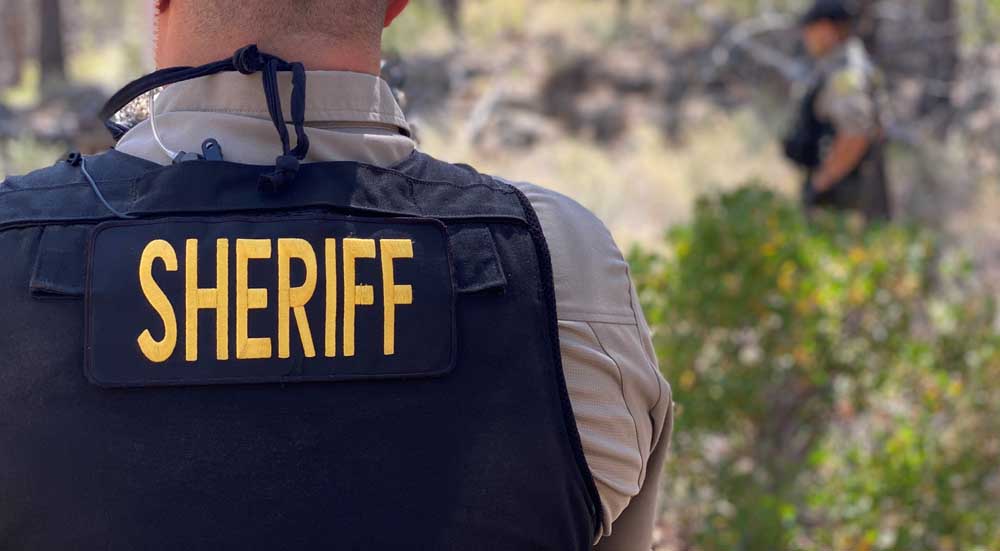Bill would compensate Oregon college athletes for use of name, image, likeness; UO, OSU support principle but oppose proposal
Published 9:18 pm Thursday, April 8, 2021

- Sen. Peter Courtney presides over the swearing in of the 81st Legislative Assembly at the Oregon State Capitol in Salem on Jan. 11, 2021.
The latest proposed state legislation to permit college athletes in Oregon to be compensated for their name, image and likeness was scheduled for its first public hearing Thursday afternoon.
Although the University of Oregon and Oregon State University are supportive of athletes being able to profit from what’s known as their NIL, the schools are opposed to the bill, which also calls for “royalty payments to each student athlete who is a current member of the team” related to an athletic department’s merchandising and apparel agreements.
Senate Bill 5, sponsored by Sens. Peter Courtney, D-Salem, and James Manning Jr., D-Eugene, would allow college athletes in the state to earn compensation for use of their name, image or likeness and to retain representation related to those opportunities so long as their agent didn’t represent the school in the prior four years. It would not allow athletes to enter into contracts that conflict with “team rules” or contracts between the athletes’ school and third parties that pertain to when an athlete is engaged in official team activities (i.e., conflicting apparel providers while playing), and would require “royalty payments to current members of team” from a school’s merchandise and apparel deals and “royalty payments plus premium to current or former member of team whose name, image or likeness is used.”
If passed, the bill would go into effect immediately, with Oregon college athletes able to earn NIL compensation beginning July 1, the same day that numerous similar laws are set to go into effect in a growing number of other states.
Courtney, the Oregon Senate President, crafted the proposed legislation and made it clear his intention is for all athletes on college teams to be able to earn a share of the apparel deals, which is the unique and controversial aspect of the bill compared to those in other states.
“You have to start with the student-athlete and end with the student-athlete or you’re not going to make any movement here,” Courtney said. “That’s why the NCAA is bogged down because these big institutions, if you start up there, you’re not going to get there.
“I have long felt … that this is an abomination.”
Manning, whose district includes the University of Oregon, views the issue in terms of equity and equality for all athletes, particularly those who are minorities and women. He cited how former Ducks women’s basketball star Sabrina Ionescu, now with the New York Liberty, was not able to profit from her name, image or likeness during her college career.
“They’re still using her likeness and her image; it’s directly tied towards U of O,” Manning said. “She’s not benefiting from that at all but the university certainly is. … These students are being taken advantage of and there’s no compensation.”
Both UO and OSU support the overarching issue of college athletes being compensated for their NIL, an issue being addressed by a growing number of state Legislatures, Congress and the NCAA. Oregon Sen. Ron Wyden is among the co-sponsors of the College Athlete Bill of Rights in Congress.
But both UO and OSU are opposed to Senate Bill 5 in its current form.
“The University of Oregon supports the ability of its student-athletes to benefit from the use of their name, image and likeness,” the university said in a statement to The Oregonian/OregonLive. “Our interest lies in making this a reality in the most efficient way possible, and one that best serves all student-athletes. We believe a national solution is the best approach that would support student-athletes equitably regardless of the institution or league for which they compete. We are working with the Pac-12, other conferences, and members of Congress to accomplish this goal.”
The royalty payments from apparel contracts in the proposed legislation are what differentiates Senate Bill 5 from similar bills and laws across the country.
Courtney said he’s confident that, if the bill passes, schools in the state, apparel providers like Nike, which has contracts with both UO and OSU, and the Higher Education Coordinating Commission would be able to “figure out how to do it in a very fair and meaningful way and a in way that really can promote themselves and promote students” for what would be pioneering merchandising deals in college athletics.
But the lack of specificity regarding this aspect of the proposed legislation is concerning to UO and OSU.
“Royalty language in the bill is vague and makes it difficult to assess how the legislation would actually be implemented, or what would be the impacts on athletic departments, including non-revenue generating sports and Title IX requirements,” OSU acting president Edward Feser said in a statement.
OSU athletic director Scott Barnes said the school “enthusiastically supports” its athletes being able to benefit from their NIL and “the OSU Athletic Department is well-positioned to assist student-athletes in maximizing opportunities that result from state or national legislation.”
A request for comment from UO athletic director Rob Mullens was referred to the university’s statement.
Nike did not immediately return a request for comment regarding the proposed bill.
Courtney and Manning said they hadn’t spoken to UO president Michael Schill or Mullens about the bill but are open to those conversations as the issue of NIL compensation for college athletes draws closer to reality.
“I’m threatening the structure,” Courtney said. “I’m threatening the organization. Higher ed is broke in many ways and this is one of the areas. … This is an opportunity to create win-win for everybody. And if you don’t start looking at it like that higher education administration, Nike, I guarantee you you’re going to get rolled on it. And when you get rolled on it, you’re going to really wonder why weren’t we smart enough to see this big typhoon coming.”








